By Yunusa Abubakar Abuja
The Executive Director, Centre for Citizens with Disabilities (CCD), Mr. David Anyaele has said that Nigerian leaders have failed to reduce poverty in the land, just as they have contributed to the growing number of persons with disabilities due to their inability to tackle extreme poverty.
He stated this during the celebration of the International Day for the Eradication of Poverty, while calling on the electorate to make poverty reduction a key campaign issue in the 2023 general elections.
He said: “October 17 annually is recognised as International Day for the Eradication of Poverty. It is a day to solidarise with people living in extreme poverty, in particular persons with disabilities, women, and children. It is also a day for sober reflection, and an opportunity to ask ourselves questions as a people on the extent we have contributed to the increase or reduction of poverty in our societies.
“The theme of this year’s commemoration is ‘Dignity for All in Practice.’ The dignity of the human being is not only a fundamental right in itself, but constitutes the basis of all other fundamental rights. The 1948 Universal Declaration of Human Rights enshrined human dignity in its preamble: “whereas, recognition of the inherent dignity and, the equal and inalienable rights of all members of the human family is the foundation of freedom, justice and peace in the world.’
The CCD helmsman expressed concern that, while other countries of the world gave more attention to poverty reduction within their societies, the situation in Nigeria revealed an increasing number of Nigerians experiencing extreme poverty.
The CCD made reference to a World Bank report titled ‘A Better Future for All Nigerians: 2022 Nigeria Poverty Assessment’, and noted that poverty reduction had stagnated since 2015, with more Nigerians falling below the poverty line over the years. The international organization projected that the number of poor Nigerians to hit 95.1 million in 2022.
According to the CCD Director, Nigeria was classified as the poverty capital of the world, because the population of Nigeria keeps growing, just as the poverty situation is also competing with the population increase in the country.
The group argued that people living in poverty have continued to experience “many interrelated and mutually reinforcing deprivations that prevent them from realizing their rights and perpetuate their poverty.”
According to the CCD other issues related to poverty are degrading working conditions, unsafe housing, limited access to nutritious food, limited access to justice, lack of access to political power and healthcare services.
Anyaele stressed the point that the poverty situation in Nigeria is manmade, occasioned by bad governance and corruption in the high places.
He said: “The current set of Nigerian leaders have failed to reduce poverty in the land. This is why we have called on politicians at different levels, especially now that the 2023 electioneering campaigns have begun to endeavour to make poverty reduction a key campaign issue.”
The CCD also tasked politicians to demonstrate through their manifestos how they intend to bend the poverty curves in Nigeria, while citizens on their own part should be ready to hold elected officials accountable for poverty reduction in the country.





















